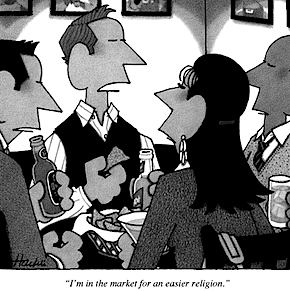
If I burden myself with a little help-mate during my adventures, it is not out of sentiment or caprice – it is that he has many fine qualities of his own that he has overlooked in his obsession with me. Indeed, any reputation I have for mental acuity and sharpness comes, in truth, from the extraordinary contrast John so selflessly provides.
–Sherlock, Sherlock, Season 3, Episode 2
Two items appeared on Andrew Sullivan’s blog Sunday morning that seemed, in proximity, to sharpen each other. The first item repeats a suggestion by Tom Ehrich, an Episcopal priest, who wrote in the Washington Post that religion is too hard:
[C]hurch often is a dangerous place, where people feel guarded, self-protective, hemmed in by tradition and expectation, required to obey rules. Church should be different from society. Instead, it plays by the same rules: get mine, be first, be right, punish the weak, exclude the different, reward the wealthy.
The theme of difficult religion is echoed in the second item, which reports on a study showing that conservative Protestant communities have higher divorce rates, even among those community members that are not conservative Protestants.
“Conservative Protestant community norms and the institutions they create seem to increase divorce risk,” researchers say in the study. For example, those who are struggling in their marriage may feel discouraged to find help in communities where marriage is idealized or marital failure is viewed as shameful, the researchers suggest.
Bashing conservative Protestants is of course quite popular (and sometimes far too easy), so I won’t vouch for the accuracy of the study. But the researchers’ suggestions make a certain kind of intuitive sense. On the other hand, maybe the researchers don’t go far enough. True, a person who is surrounded by religious people may be afraid to seek help. But sometimes, when a person seeks help from religion, he or she doesn’t get the kind of help they need.
[youtube http://www.youtube.com/watch?v=lY3V6ZAb_A0&w=600]
As some of us are painfully aware, a person who seeks religious help will often be met with a list of rules: Read your Bible more, pray more, get more involved in your community, stop getting so angry. But rules—even good rules—are unable to inspire obedience. Not the heartfelt kind at least. Indeed, instead of inspiring obedience, rules tend to inspire disobedience or, at best, a run for the hills. So a person struggling in his marriage who is told to be a better husband by becoming a stronger leader or a more thoughtful and sensitive spouse, will not be equipped to fix his marriage. He will just be driven further into despair, as he can never muster up the will to be better. If he could have, he likely would have.
Ehrich’s answer to this conundrum is for the church to provide shelter from the rules. “Church,” says Ehrich, “should be a safe place — safe to be oneself, safe to make one’s confession, safe to love whoever one feels called to love, safe to imagine more, safe to fail.” Safety always sounds appealing. Yet, I wonder if, to the man whose marriage is failing, safety provides much solace. If his marriage is failing, it doesn’t matter whether it fails in a safe place or a dangerous place. It still ends up in pieces on the ground.
[youtube http://www.youtube.com/watch?v=Rlwg_sFYUjE&w=600]
A marriage can’t be saved by complying with rules, because compliance with the rules is impossible. A marriage can’t be saved by avoidance, because a spouse cannot be avoided forever. The only thing to do with the rules is to let them kill you–or give them your best shot and be killed anyway.
In other words, religion isn’t difficult; it’s impossible. But oddly enough, from that impossibility often springs the freedom to love.

COMMENTS
One response to “Don’t Gimme Shelter”
Leave a Reply













I agree–the law is impossible for Christians to keep. The solution cannot be us being enabled to keep the law, but instead being legally identified with Christ’s death to the law (Romans 6 to 7:6)
Jones (Antinomianism, 2013, P and R) even links John Cotton with being “antinomian” because Cotton understood God’s imputation to be before faith, and a cause of faith. (But see II Peter 1:1, Galatians 3-4, given the Spirit because of being sons, Romans 8:10, life because of righteousness.) Along the way, Jones provocatively accuses those in the “Sonship” faction as giving “boring…messages each week when they have a sort of systematic theology that they need to declare every Lord’s day”. (p 118).
Reactionary that I am, I become bored with those who make everything to be about “union with” the resurrected Christ so that we Christians “can and will” now do what Christ did. These folks who keep repeating “threefold union” always take almost no time to forget union by election or by imputation, so that they can run back to “union by faith” or “union by the Spirit” or to “Christ in us” instead of “us in Christ”, which they did not deny but which they never stop to talk about.
It’s very much like those who speak of “threefold sanctification”, in which they do not deny that, in biblicist terms, sanctification is an EITHER OR and based on being in Christ’s death OR NOT (Hebrews 10, sanctified by the blood), and in which they do not deny that “sanctification is by the effectual call and hearing of the gospel by the Holy Spirit in believing the gospel about what Christ did (II Thess 2:13), but then from on, talk about nothing but a “conditional sanctification” which depends on our cooperation and effort. To believe the gospel is the same as obeying the gospel. To live by faith is to do what Jesus says to do. Some of us are doing it. You are not doing it.
I am bored with moralist preaching. It does not seem to me very different from Arminian preaching.